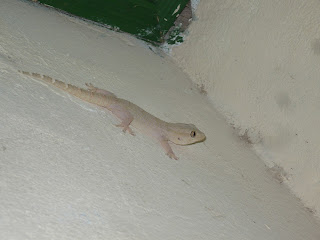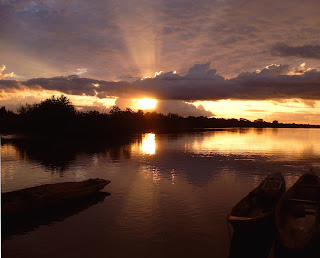- Get up at about 7, although the rooster has been crowing at an annoyingly close range for at least 3 hours and call-to-prayer has occurred at around 5:45.
- Brush teeth, wash face and comb hair outside in the bathroom area.
- Go out of the house and greet family, then water plants (okra, watermelon, squash and basil) - this requires several trips to the tap with a bucket.
- Bring some water inside to boil so I can have tea. Make oatmeal, to which I add sugar (or honey if we have it), raisins (if we picked some up in the big city) and peanut butter. Read for awhile and enjoy my tea.
- At 8:45 get dressed, say goodbye to Darrin and walk over to the hospital where I help out at the reproductive and child health clinic.
- On Mondays it is in Bwiam - a few other days a week everyone piles in the ambulance (actually a Landrover) and travels to an outlying village's health center to weigh babies, dispense medications, give immunizations and do prenatal exams.
- I have been trying to help the staff to do short health talks at each clinic - right now we have been doing a family planning one. I made a poster comparing birth spacing in families to crop spacing on farms and talk about how plants and families grow better and healthier when they are planned/"well-spaced." This can get complicated because we usually translate the talk into 2 or 3 langauges - English, Mandinka, Wolof and sometimes Jola or Fula. I'm not ready to do the Mandinka talk yet - maybe I never will be, because people might miss something due to my accent. I instead greet the women and introduce myself in Mandinka and then switch to English, which involves speaking very slowly and clearly, because many people here who speak English can't understand it when you speak fast or use too large a vocabulary.
- If it is not too late when I get done with clinic, I will try to buy some vegetables or other things at the market. It's tricky because the market is usually over by 1 in the afternoon.
- I have one friend, Sirrah, who sells at the market and is always very nice. I try to buy from her, although she doesn't have much for sale. Sometimes there is nothing for sale but onions and okra...but once in awhile there are cucumbers or green peppers.
- I buy a lot of groundnut paste (it's like unsalted natural peanut butter, in a small plastic bag), garlic and pepper corns, which we pound. Sometimes I buy a smoked fish for the cat. I have learned the hard way not to put a fish in my tote bag (even if it's wrapped in newspaper!)...too smelly!
- After the market I go home and take a bucket bath and change my clothes because I am inevitably very hot and sweaty. I may rest for a bit in the house or do some laundry.
- Around 3pm I head over to our family's other compound for lunch. Darrin usually meets me there when he is done with work and we eat - I am always hoping for durango, which is a peanut-based sauce over rice. I dislike supa konja, which is a slimy okra, greens and fish goo over rice. We sit with whichever family members are there (often some of the women or girls are busy braiding hair under a tree) and maybe play with some of the kids.
- Around 4:30 or 5 we usually make our way home. On the way home we might stop at the biddik (corner shop) for bread, flour, eggs or a cold drink. We also sometimes stop to chat with a friend or two, though I try to avoid being offered attaya (the strong sugary tea drink people love to sit and brew and serve in little shot glasses) at this time of day because it is so caffienated it will make sleep difficult later.
- Once we get home we relax, take a quick bucket bath to cool off, then read or work on things around the house or yard. I like to prep something for dinner before the sun goes down, because without electricity we must rely on headlamp and candles at night, which are fine for reading, etc., but sometimes it is hard to prepare a meal that way. Recently I helped with peanut harvesting, so here I am shelling peanuts and preparing to roast them with our sister Awa.
 |
| Awa and Mama shelling groundnuts ("tio" in Mandinka). |
- Some days, if our site-mate (other Peace Corps volunteer in our area), Dylan, is in town, we bike over to his side of town and walk down to the river to watch the sunset on the dock. If we aren't in a hurry to go home, we have supper at his family's compound.
Kawsu's Day
- Get up at the same time as Maamaa, but then stay in bed and snooze until 8:30 because the rooster has kept me from getting a proper rest all morning. He usually stands directly in front of our screen door and crows (4 a.m.). Some days I want to eat him for lunch, but we can't because he is good luck for our compound (meaning he was purchased solely for that reason).
- Officially get up at 8:30, wash my face and put our small solar panel out in the sun to charge - takes about 3 days of full sun for a full charge (good to have in case we need emergency cell phone charge on weekends).
- Head to the "kitchen area" and make some tea with powdered milk and sugar. Prepare a small cup of meuslix mixed with oatmeal (to stretch the meuslix because it's expensive) and reconstituted powdered milk. Usually during breakfast I just sit in a plastic lawn chair, think about our life here and sip my tea.
 |
| Our kitchen area was created with the help of our local carpenter Sheik Nyang |
- Feed the cat a small amount of cat food or dried fish. She has been eating lizards lately so we don't feed her much. Hopefully our cat will never catch this gecko which stays in our home and munches on beetles and mosquitoes. We are very fond of it.
 |
| Resident gecko in our front room. We named it Tom Thumb. |
- Greet the family outside with any of the following phrases: "I saama" (good morning), "Somandaa be naadi?" (how is the morning?) or "Kori I sinoota" (I hope you slept).
- Wash dishes in a little bucket by our door and set them to dry on a board in the sun. Then I usually sweep the front room and bedroom because over night much sand and dust has accumulated on the floor.
- At this point I may do some laundry in a bucket depending on the clothes situation, whether Colette has done them already or whether or not our sisters are doing laundry for the whole family. If this happens there's usually no space for our clothes on the line, so we just wait.
- 10 a.m. get dressed for work, spray my limbs with insect repellent (many mosquitoes at work), take my bicycle outside, lock our door, and tell any present family member the following: "Nka ta dokouwo (I am going to work), fo tilibulo (until the afternoon)."
- Ride my bicycle about 2 kilometers to St. Joseph's Family Farms Centre and greet everyone in the organization.
- Proceed to the office and work on any of the following: editing grant proposals, preparing reports for World Food Programme, or reading about appropriate technology/projects for the community. Lately we've been organizing old files, so I read about many previous community projects.
- 2:30-4pm wrap up my work, say "Fo saama" (until tomorrow) to my co-workers and bike to our families large compound. On this bike ride I usually meet many children walking back home from school so it's inevitable that a couple will shout "Toubab(white man)! Any minties (candy)?" To which I usually stop my bicycle suddenly, dismount and try to locate said children and introduce myself, or maybe run after them to get some laughs.
- Reach family compound and greet family with "Tilibulo be naadi?" ("How is the afternoon?") and proceed to find the most shade in the compound to eat under.
- 4:30-5pm head home and buy any necessary food items to prepare our evening meal.
- Take bucket bath immediately, bring in solar panel, check on all plants, pet cat and ask her about her day (or look for dead lizard presents around the compound).
- Rest a bit, prep some food and either read or do a crossword puzzle, or give a fellow Peace Corps Volunteer a haircut:
 |
| Takaa our cat relaxing (fonyonding) on our window sill. |
 |
| Dylan (our site mate) at "Kawsu's Barbing Saloon" prior to one of the last storms of the rainy season in Bwiam. |
- 10pm take a small bucket bath again to cool off before bedtime, get into bed, tuck in mosquito net, turn off headlamp and sweat ourselves to sleep until the cool harmattan winds from the desert come during the cold season.



